Learning and Development: Comparing Learning Organisations Report
VerifiedAdded on 2023/01/06
|12
|3355
|89
Report
AI Summary
This report provides a comprehensive analysis of organizational learning and learning organizations. It begins by defining both concepts and then critically analyzes their differences, exploring key aspects such as their objectives, focus, and implementation. The report examines various models and theories, including Senge's five disciplines of a learning organization and single and double-loop learning. It also discusses the significance of organizational learning and development, highlighting their impact on employee performance, innovation, and overall business success. The report uses academic sources to support its claims, offering a well-rounded perspective on these important concepts in leadership management. The report concludes by summarizing the key distinctions between organizational learning and learning organizations, providing a valuable resource for understanding and applying these concepts in a practical setting.
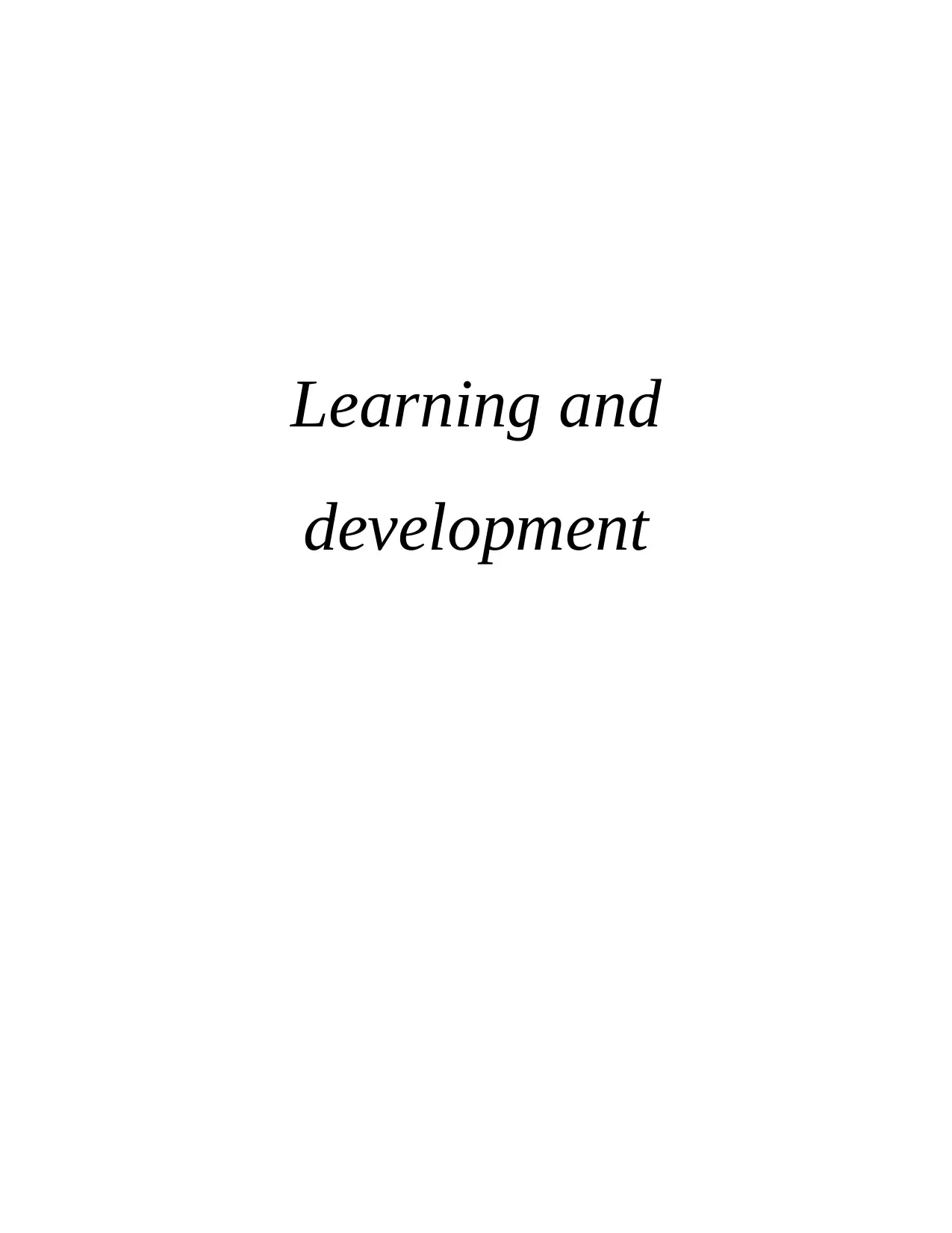
Learning and
development
development
Paraphrase This Document
Need a fresh take? Get an instant paraphrase of this document with our AI Paraphraser
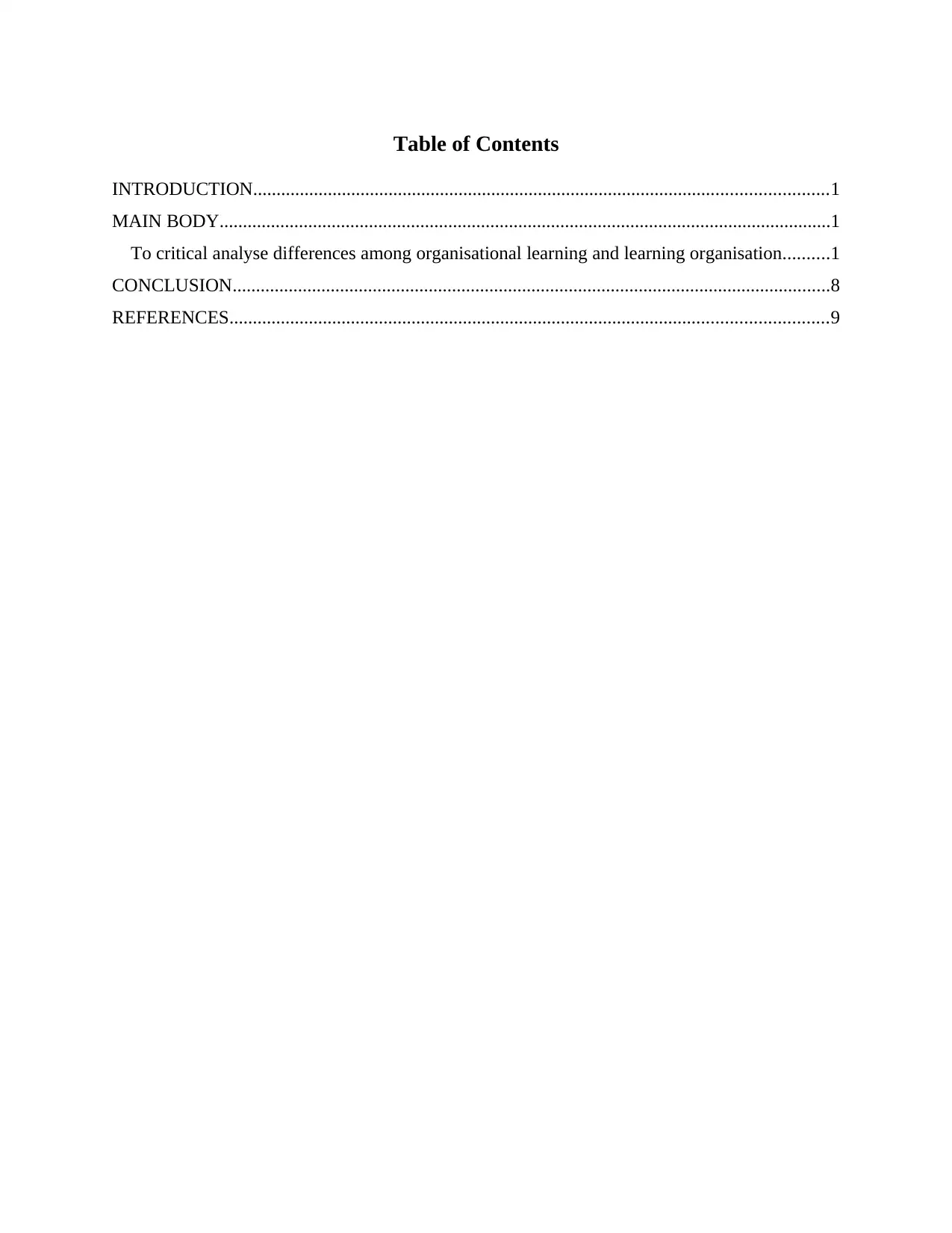
Table of Contents
INTRODUCTION...........................................................................................................................1
MAIN BODY...................................................................................................................................1
To critical analyse differences among organisational learning and learning organisation..........1
CONCLUSION................................................................................................................................8
REFERENCES................................................................................................................................9
INTRODUCTION...........................................................................................................................1
MAIN BODY...................................................................................................................................1
To critical analyse differences among organisational learning and learning organisation..........1
CONCLUSION................................................................................................................................8
REFERENCES................................................................................................................................9
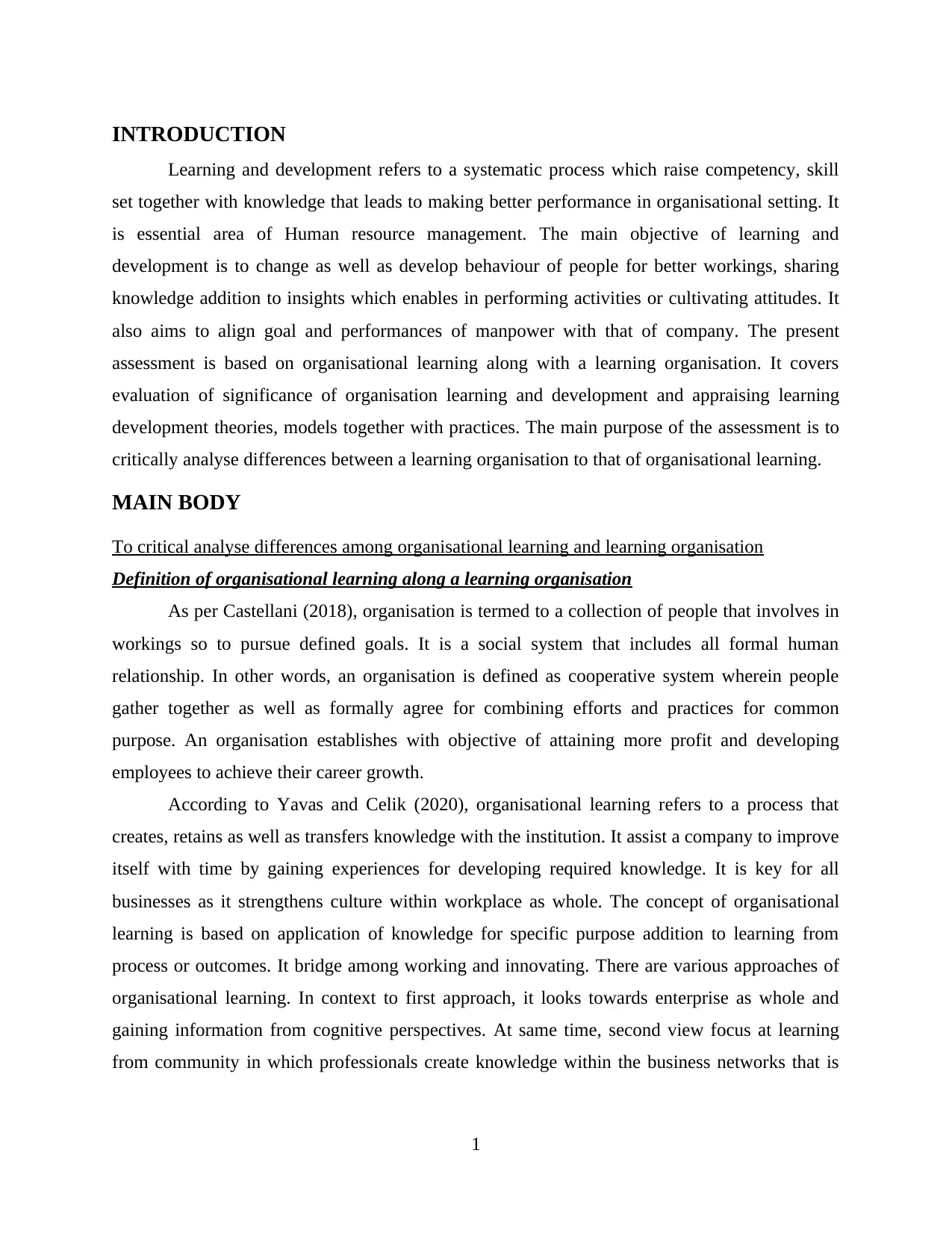
INTRODUCTION
Learning and development refers to a systematic process which raise competency, skill
set together with knowledge that leads to making better performance in organisational setting. It
is essential area of Human resource management. The main objective of learning and
development is to change as well as develop behaviour of people for better workings, sharing
knowledge addition to insights which enables in performing activities or cultivating attitudes. It
also aims to align goal and performances of manpower with that of company. The present
assessment is based on organisational learning along with a learning organisation. It covers
evaluation of significance of organisation learning and development and appraising learning
development theories, models together with practices. The main purpose of the assessment is to
critically analyse differences between a learning organisation to that of organisational learning.
MAIN BODY
To critical analyse differences among organisational learning and learning organisation
Definition of organisational learning along a learning organisation
As per Castellani (2018), organisation is termed to a collection of people that involves in
workings so to pursue defined goals. It is a social system that includes all formal human
relationship. In other words, an organisation is defined as cooperative system wherein people
gather together as well as formally agree for combining efforts and practices for common
purpose. An organisation establishes with objective of attaining more profit and developing
employees to achieve their career growth.
According to Yavas and Celik (2020), organisational learning refers to a process that
creates, retains as well as transfers knowledge with the institution. It assist a company to improve
itself with time by gaining experiences for developing required knowledge. It is key for all
businesses as it strengthens culture within workplace as whole. The concept of organisational
learning is based on application of knowledge for specific purpose addition to learning from
process or outcomes. It bridge among working and innovating. There are various approaches of
organisational learning. In context to first approach, it looks towards enterprise as whole and
gaining information from cognitive perspectives. At same time, second view focus at learning
from community in which professionals create knowledge within the business networks that is
1
Learning and development refers to a systematic process which raise competency, skill
set together with knowledge that leads to making better performance in organisational setting. It
is essential area of Human resource management. The main objective of learning and
development is to change as well as develop behaviour of people for better workings, sharing
knowledge addition to insights which enables in performing activities or cultivating attitudes. It
also aims to align goal and performances of manpower with that of company. The present
assessment is based on organisational learning along with a learning organisation. It covers
evaluation of significance of organisation learning and development and appraising learning
development theories, models together with practices. The main purpose of the assessment is to
critically analyse differences between a learning organisation to that of organisational learning.
MAIN BODY
To critical analyse differences among organisational learning and learning organisation
Definition of organisational learning along a learning organisation
As per Castellani (2018), organisation is termed to a collection of people that involves in
workings so to pursue defined goals. It is a social system that includes all formal human
relationship. In other words, an organisation is defined as cooperative system wherein people
gather together as well as formally agree for combining efforts and practices for common
purpose. An organisation establishes with objective of attaining more profit and developing
employees to achieve their career growth.
According to Yavas and Celik (2020), organisational learning refers to a process that
creates, retains as well as transfers knowledge with the institution. It assist a company to improve
itself with time by gaining experiences for developing required knowledge. It is key for all
businesses as it strengthens culture within workplace as whole. The concept of organisational
learning is based on application of knowledge for specific purpose addition to learning from
process or outcomes. It bridge among working and innovating. There are various approaches of
organisational learning. In context to first approach, it looks towards enterprise as whole and
gaining information from cognitive perspectives. At same time, second view focus at learning
from community in which professionals create knowledge within the business networks that is
1
⊘ This is a preview!⊘
Do you want full access?
Subscribe today to unlock all pages.

Trusted by 1+ million students worldwide
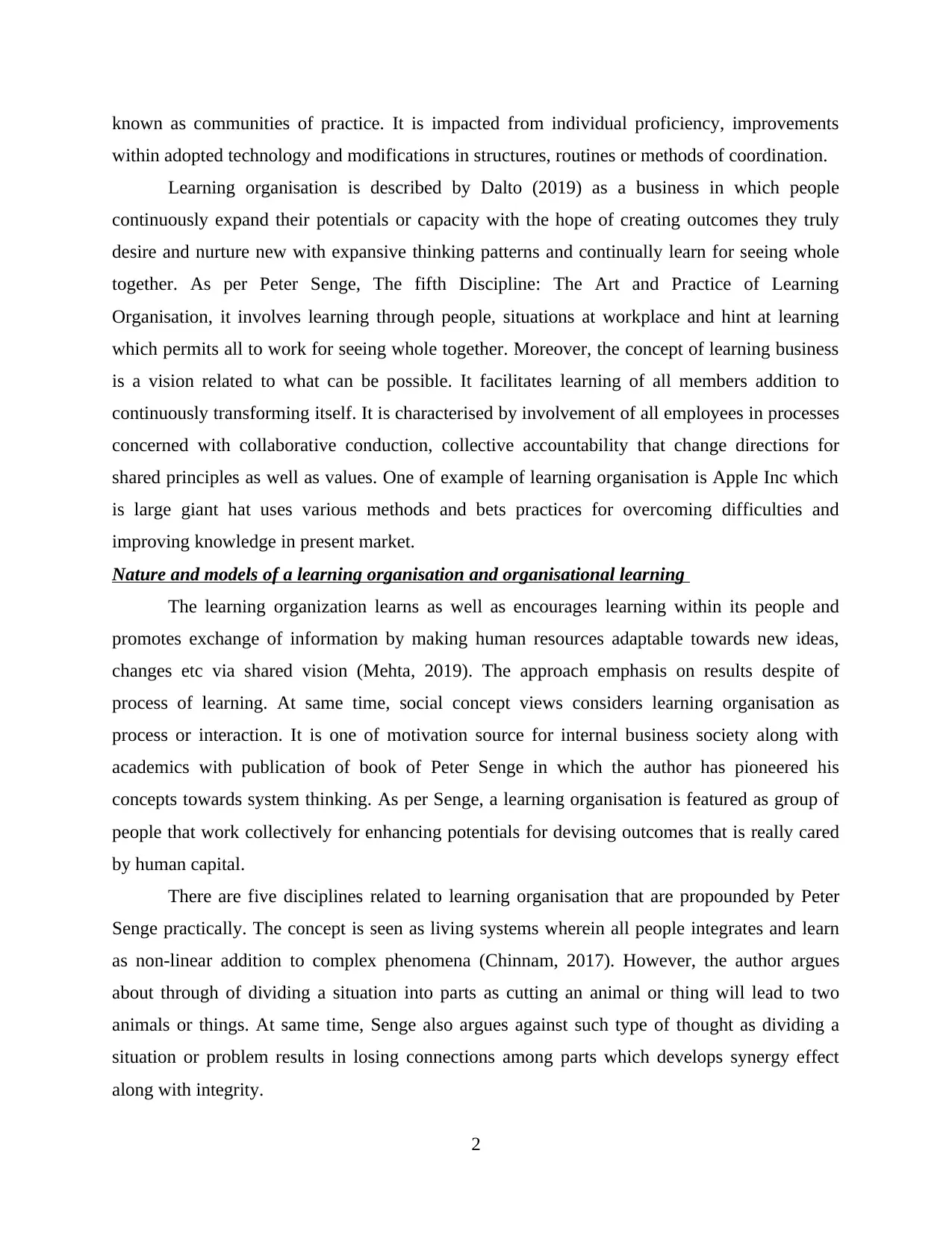
known as communities of practice. It is impacted from individual proficiency, improvements
within adopted technology and modifications in structures, routines or methods of coordination.
Learning organisation is described by Dalto (2019) as a business in which people
continuously expand their potentials or capacity with the hope of creating outcomes they truly
desire and nurture new with expansive thinking patterns and continually learn for seeing whole
together. As per Peter Senge, The fifth Discipline: The Art and Practice of Learning
Organisation, it involves learning through people, situations at workplace and hint at learning
which permits all to work for seeing whole together. Moreover, the concept of learning business
is a vision related to what can be possible. It facilitates learning of all members addition to
continuously transforming itself. It is characterised by involvement of all employees in processes
concerned with collaborative conduction, collective accountability that change directions for
shared principles as well as values. One of example of learning organisation is Apple Inc which
is large giant hat uses various methods and bets practices for overcoming difficulties and
improving knowledge in present market.
Nature and models of a learning organisation and organisational learning
The learning organization learns as well as encourages learning within its people and
promotes exchange of information by making human resources adaptable towards new ideas,
changes etc via shared vision (Mehta, 2019). The approach emphasis on results despite of
process of learning. At same time, social concept views considers learning organisation as
process or interaction. It is one of motivation source for internal business society along with
academics with publication of book of Peter Senge in which the author has pioneered his
concepts towards system thinking. As per Senge, a learning organisation is featured as group of
people that work collectively for enhancing potentials for devising outcomes that is really cared
by human capital.
There are five disciplines related to learning organisation that are propounded by Peter
Senge practically. The concept is seen as living systems wherein all people integrates and learn
as non-linear addition to complex phenomena (Chinnam, 2017). However, the author argues
about through of dividing a situation into parts as cutting an animal or thing will lead to two
animals or things. At same time, Senge also argues against such type of thought as dividing a
situation or problem results in losing connections among parts which develops synergy effect
along with integrity.
2
within adopted technology and modifications in structures, routines or methods of coordination.
Learning organisation is described by Dalto (2019) as a business in which people
continuously expand their potentials or capacity with the hope of creating outcomes they truly
desire and nurture new with expansive thinking patterns and continually learn for seeing whole
together. As per Peter Senge, The fifth Discipline: The Art and Practice of Learning
Organisation, it involves learning through people, situations at workplace and hint at learning
which permits all to work for seeing whole together. Moreover, the concept of learning business
is a vision related to what can be possible. It facilitates learning of all members addition to
continuously transforming itself. It is characterised by involvement of all employees in processes
concerned with collaborative conduction, collective accountability that change directions for
shared principles as well as values. One of example of learning organisation is Apple Inc which
is large giant hat uses various methods and bets practices for overcoming difficulties and
improving knowledge in present market.
Nature and models of a learning organisation and organisational learning
The learning organization learns as well as encourages learning within its people and
promotes exchange of information by making human resources adaptable towards new ideas,
changes etc via shared vision (Mehta, 2019). The approach emphasis on results despite of
process of learning. At same time, social concept views considers learning organisation as
process or interaction. It is one of motivation source for internal business society along with
academics with publication of book of Peter Senge in which the author has pioneered his
concepts towards system thinking. As per Senge, a learning organisation is featured as group of
people that work collectively for enhancing potentials for devising outcomes that is really cared
by human capital.
There are five disciplines related to learning organisation that are propounded by Peter
Senge practically. The concept is seen as living systems wherein all people integrates and learn
as non-linear addition to complex phenomena (Chinnam, 2017). However, the author argues
about through of dividing a situation into parts as cutting an animal or thing will lead to two
animals or things. At same time, Senge also argues against such type of thought as dividing a
situation or problem results in losing connections among parts which develops synergy effect
along with integrity.
2
Paraphrase This Document
Need a fresh take? Get an instant paraphrase of this document with our AI Paraphraser
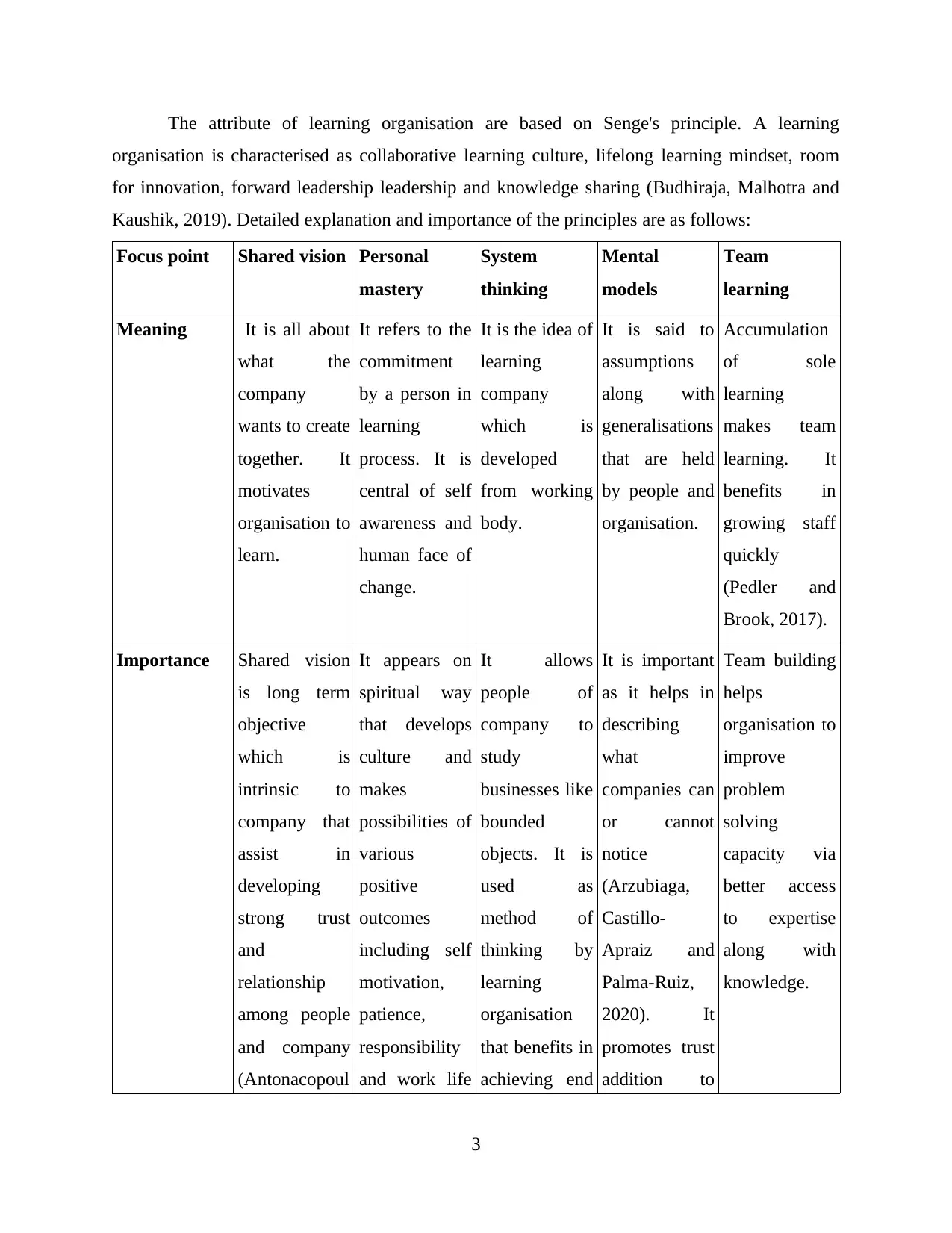
The attribute of learning organisation are based on Senge's principle. A learning
organisation is characterised as collaborative learning culture, lifelong learning mindset, room
for innovation, forward leadership leadership and knowledge sharing (Budhiraja, Malhotra and
Kaushik, 2019). Detailed explanation and importance of the principles are as follows:
Focus point Shared vision Personal
mastery
System
thinking
Mental
models
Team
learning
Meaning It is all about
what the
company
wants to create
together. It
motivates
organisation to
learn.
It refers to the
commitment
by a person in
learning
process. It is
central of self
awareness and
human face of
change.
It is the idea of
learning
company
which is
developed
from working
body.
It is said to
assumptions
along with
generalisations
that are held
by people and
organisation.
Accumulation
of sole
learning
makes team
learning. It
benefits in
growing staff
quickly
(Pedler and
Brook, 2017).
Importance Shared vision
is long term
objective
which is
intrinsic to
company that
assist in
developing
strong trust
and
relationship
among people
and company
(Antonacopoul
It appears on
spiritual way
that develops
culture and
makes
possibilities of
various
positive
outcomes
including self
motivation,
patience,
responsibility
and work life
It allows
people of
company to
study
businesses like
bounded
objects. It is
used as
method of
thinking by
learning
organisation
that benefits in
achieving end
It is important
as it helps in
describing
what
companies can
or cannot
notice
(Arzubiaga,
Castillo-
Apraiz and
Palma-Ruiz,
2020). It
promotes trust
addition to
Team building
helps
organisation to
improve
problem
solving
capacity via
better access
to expertise
along with
knowledge.
3
organisation is characterised as collaborative learning culture, lifelong learning mindset, room
for innovation, forward leadership leadership and knowledge sharing (Budhiraja, Malhotra and
Kaushik, 2019). Detailed explanation and importance of the principles are as follows:
Focus point Shared vision Personal
mastery
System
thinking
Mental
models
Team
learning
Meaning It is all about
what the
company
wants to create
together. It
motivates
organisation to
learn.
It refers to the
commitment
by a person in
learning
process. It is
central of self
awareness and
human face of
change.
It is the idea of
learning
company
which is
developed
from working
body.
It is said to
assumptions
along with
generalisations
that are held
by people and
organisation.
Accumulation
of sole
learning
makes team
learning. It
benefits in
growing staff
quickly
(Pedler and
Brook, 2017).
Importance Shared vision
is long term
objective
which is
intrinsic to
company that
assist in
developing
strong trust
and
relationship
among people
and company
(Antonacopoul
It appears on
spiritual way
that develops
culture and
makes
possibilities of
various
positive
outcomes
including self
motivation,
patience,
responsibility
and work life
It allows
people of
company to
study
businesses like
bounded
objects. It is
used as
method of
thinking by
learning
organisation
that benefits in
achieving end
It is important
as it helps in
describing
what
companies can
or cannot
notice
(Arzubiaga,
Castillo-
Apraiz and
Palma-Ruiz,
2020). It
promotes trust
addition to
Team building
helps
organisation to
improve
problem
solving
capacity via
better access
to expertise
along with
knowledge.
3
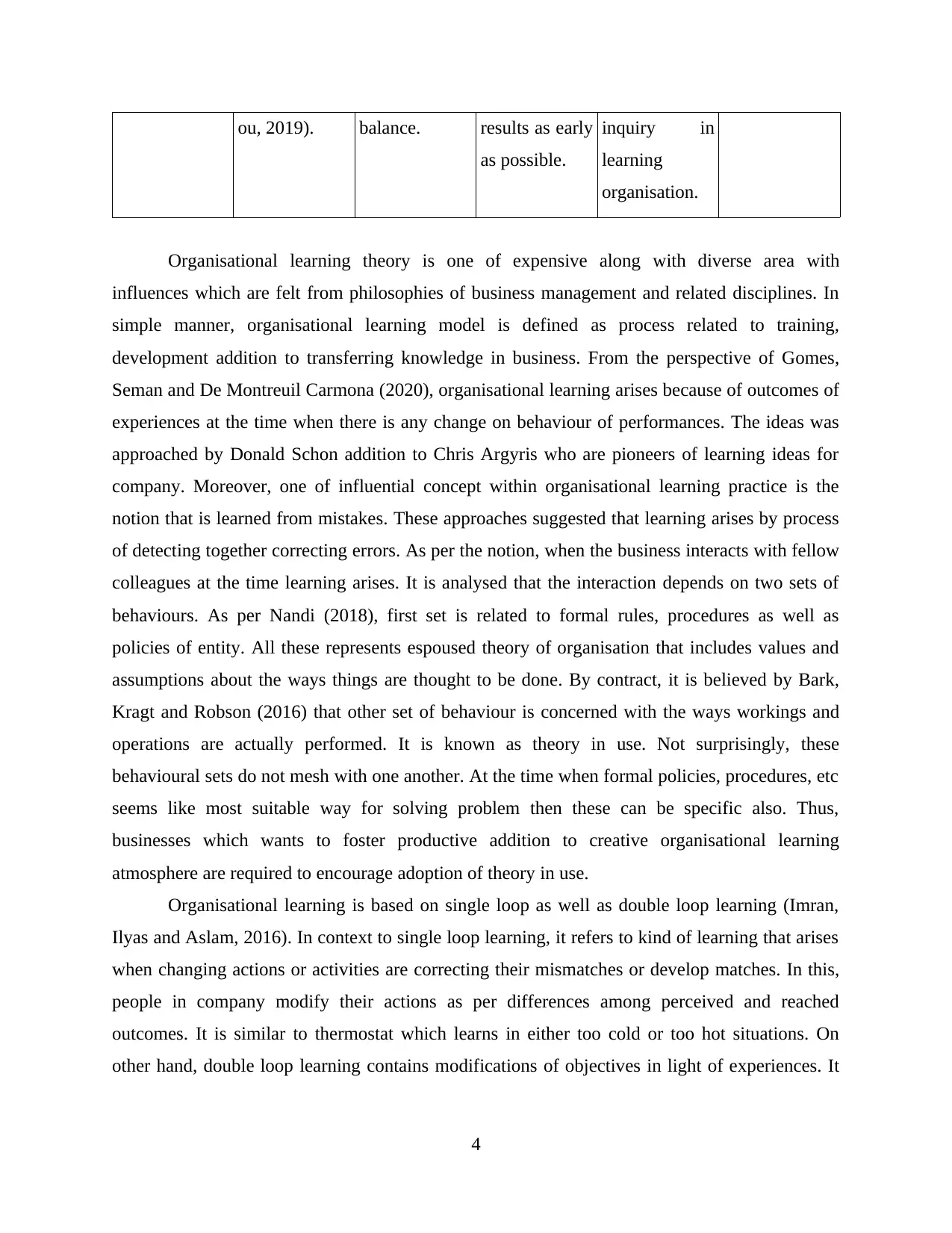
ou, 2019). balance. results as early
as possible.
inquiry in
learning
organisation.
Organisational learning theory is one of expensive along with diverse area with
influences which are felt from philosophies of business management and related disciplines. In
simple manner, organisational learning model is defined as process related to training,
development addition to transferring knowledge in business. From the perspective of Gomes,
Seman and De Montreuil Carmona (2020), organisational learning arises because of outcomes of
experiences at the time when there is any change on behaviour of performances. The ideas was
approached by Donald Schon addition to Chris Argyris who are pioneers of learning ideas for
company. Moreover, one of influential concept within organisational learning practice is the
notion that is learned from mistakes. These approaches suggested that learning arises by process
of detecting together correcting errors. As per the notion, when the business interacts with fellow
colleagues at the time learning arises. It is analysed that the interaction depends on two sets of
behaviours. As per Nandi (2018), first set is related to formal rules, procedures as well as
policies of entity. All these represents espoused theory of organisation that includes values and
assumptions about the ways things are thought to be done. By contract, it is believed by Bark,
Kragt and Robson (2016) that other set of behaviour is concerned with the ways workings and
operations are actually performed. It is known as theory in use. Not surprisingly, these
behavioural sets do not mesh with one another. At the time when formal policies, procedures, etc
seems like most suitable way for solving problem then these can be specific also. Thus,
businesses which wants to foster productive addition to creative organisational learning
atmosphere are required to encourage adoption of theory in use.
Organisational learning is based on single loop as well as double loop learning (Imran,
Ilyas and Aslam, 2016). In context to single loop learning, it refers to kind of learning that arises
when changing actions or activities are correcting their mismatches or develop matches. In this,
people in company modify their actions as per differences among perceived and reached
outcomes. It is similar to thermostat which learns in either too cold or too hot situations. On
other hand, double loop learning contains modifications of objectives in light of experiences. It
4
as possible.
inquiry in
learning
organisation.
Organisational learning theory is one of expensive along with diverse area with
influences which are felt from philosophies of business management and related disciplines. In
simple manner, organisational learning model is defined as process related to training,
development addition to transferring knowledge in business. From the perspective of Gomes,
Seman and De Montreuil Carmona (2020), organisational learning arises because of outcomes of
experiences at the time when there is any change on behaviour of performances. The ideas was
approached by Donald Schon addition to Chris Argyris who are pioneers of learning ideas for
company. Moreover, one of influential concept within organisational learning practice is the
notion that is learned from mistakes. These approaches suggested that learning arises by process
of detecting together correcting errors. As per the notion, when the business interacts with fellow
colleagues at the time learning arises. It is analysed that the interaction depends on two sets of
behaviours. As per Nandi (2018), first set is related to formal rules, procedures as well as
policies of entity. All these represents espoused theory of organisation that includes values and
assumptions about the ways things are thought to be done. By contract, it is believed by Bark,
Kragt and Robson (2016) that other set of behaviour is concerned with the ways workings and
operations are actually performed. It is known as theory in use. Not surprisingly, these
behavioural sets do not mesh with one another. At the time when formal policies, procedures, etc
seems like most suitable way for solving problem then these can be specific also. Thus,
businesses which wants to foster productive addition to creative organisational learning
atmosphere are required to encourage adoption of theory in use.
Organisational learning is based on single loop as well as double loop learning (Imran,
Ilyas and Aslam, 2016). In context to single loop learning, it refers to kind of learning that arises
when changing actions or activities are correcting their mismatches or develop matches. In this,
people in company modify their actions as per differences among perceived and reached
outcomes. It is similar to thermostat which learns in either too cold or too hot situations. On
other hand, double loop learning contains modifications of objectives in light of experiences. It
4
⊘ This is a preview!⊘
Do you want full access?
Subscribe today to unlock all pages.

Trusted by 1+ million students worldwide
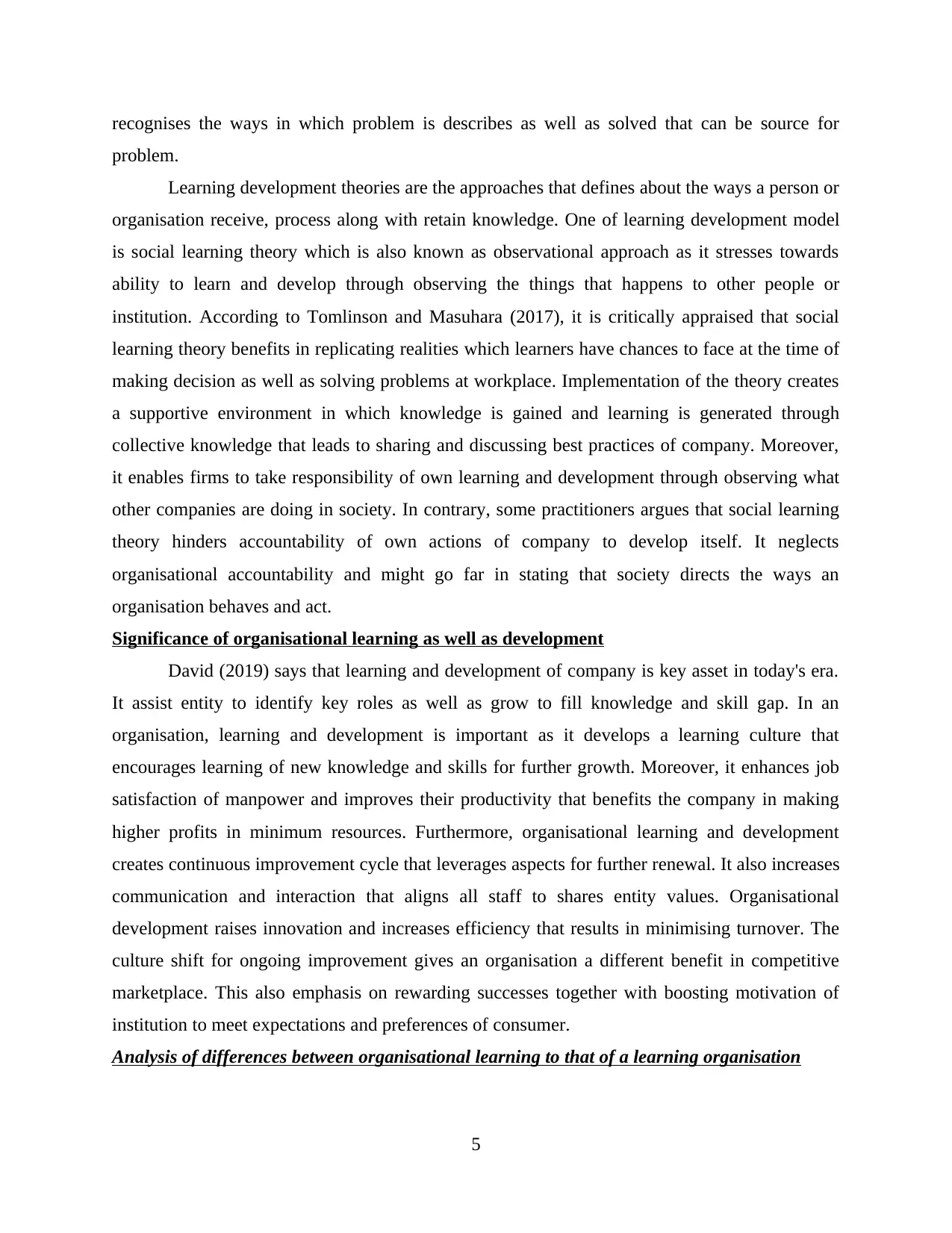
recognises the ways in which problem is describes as well as solved that can be source for
problem.
Learning development theories are the approaches that defines about the ways a person or
organisation receive, process along with retain knowledge. One of learning development model
is social learning theory which is also known as observational approach as it stresses towards
ability to learn and develop through observing the things that happens to other people or
institution. According to Tomlinson and Masuhara (2017), it is critically appraised that social
learning theory benefits in replicating realities which learners have chances to face at the time of
making decision as well as solving problems at workplace. Implementation of the theory creates
a supportive environment in which knowledge is gained and learning is generated through
collective knowledge that leads to sharing and discussing best practices of company. Moreover,
it enables firms to take responsibility of own learning and development through observing what
other companies are doing in society. In contrary, some practitioners argues that social learning
theory hinders accountability of own actions of company to develop itself. It neglects
organisational accountability and might go far in stating that society directs the ways an
organisation behaves and act.
Significance of organisational learning as well as development
David (2019) says that learning and development of company is key asset in today's era.
It assist entity to identify key roles as well as grow to fill knowledge and skill gap. In an
organisation, learning and development is important as it develops a learning culture that
encourages learning of new knowledge and skills for further growth. Moreover, it enhances job
satisfaction of manpower and improves their productivity that benefits the company in making
higher profits in minimum resources. Furthermore, organisational learning and development
creates continuous improvement cycle that leverages aspects for further renewal. It also increases
communication and interaction that aligns all staff to shares entity values. Organisational
development raises innovation and increases efficiency that results in minimising turnover. The
culture shift for ongoing improvement gives an organisation a different benefit in competitive
marketplace. This also emphasis on rewarding successes together with boosting motivation of
institution to meet expectations and preferences of consumer.
Analysis of differences between organisational learning to that of a learning organisation
5
problem.
Learning development theories are the approaches that defines about the ways a person or
organisation receive, process along with retain knowledge. One of learning development model
is social learning theory which is also known as observational approach as it stresses towards
ability to learn and develop through observing the things that happens to other people or
institution. According to Tomlinson and Masuhara (2017), it is critically appraised that social
learning theory benefits in replicating realities which learners have chances to face at the time of
making decision as well as solving problems at workplace. Implementation of the theory creates
a supportive environment in which knowledge is gained and learning is generated through
collective knowledge that leads to sharing and discussing best practices of company. Moreover,
it enables firms to take responsibility of own learning and development through observing what
other companies are doing in society. In contrary, some practitioners argues that social learning
theory hinders accountability of own actions of company to develop itself. It neglects
organisational accountability and might go far in stating that society directs the ways an
organisation behaves and act.
Significance of organisational learning as well as development
David (2019) says that learning and development of company is key asset in today's era.
It assist entity to identify key roles as well as grow to fill knowledge and skill gap. In an
organisation, learning and development is important as it develops a learning culture that
encourages learning of new knowledge and skills for further growth. Moreover, it enhances job
satisfaction of manpower and improves their productivity that benefits the company in making
higher profits in minimum resources. Furthermore, organisational learning and development
creates continuous improvement cycle that leverages aspects for further renewal. It also increases
communication and interaction that aligns all staff to shares entity values. Organisational
development raises innovation and increases efficiency that results in minimising turnover. The
culture shift for ongoing improvement gives an organisation a different benefit in competitive
marketplace. This also emphasis on rewarding successes together with boosting motivation of
institution to meet expectations and preferences of consumer.
Analysis of differences between organisational learning to that of a learning organisation
5
Paraphrase This Document
Need a fresh take? Get an instant paraphrase of this document with our AI Paraphraser
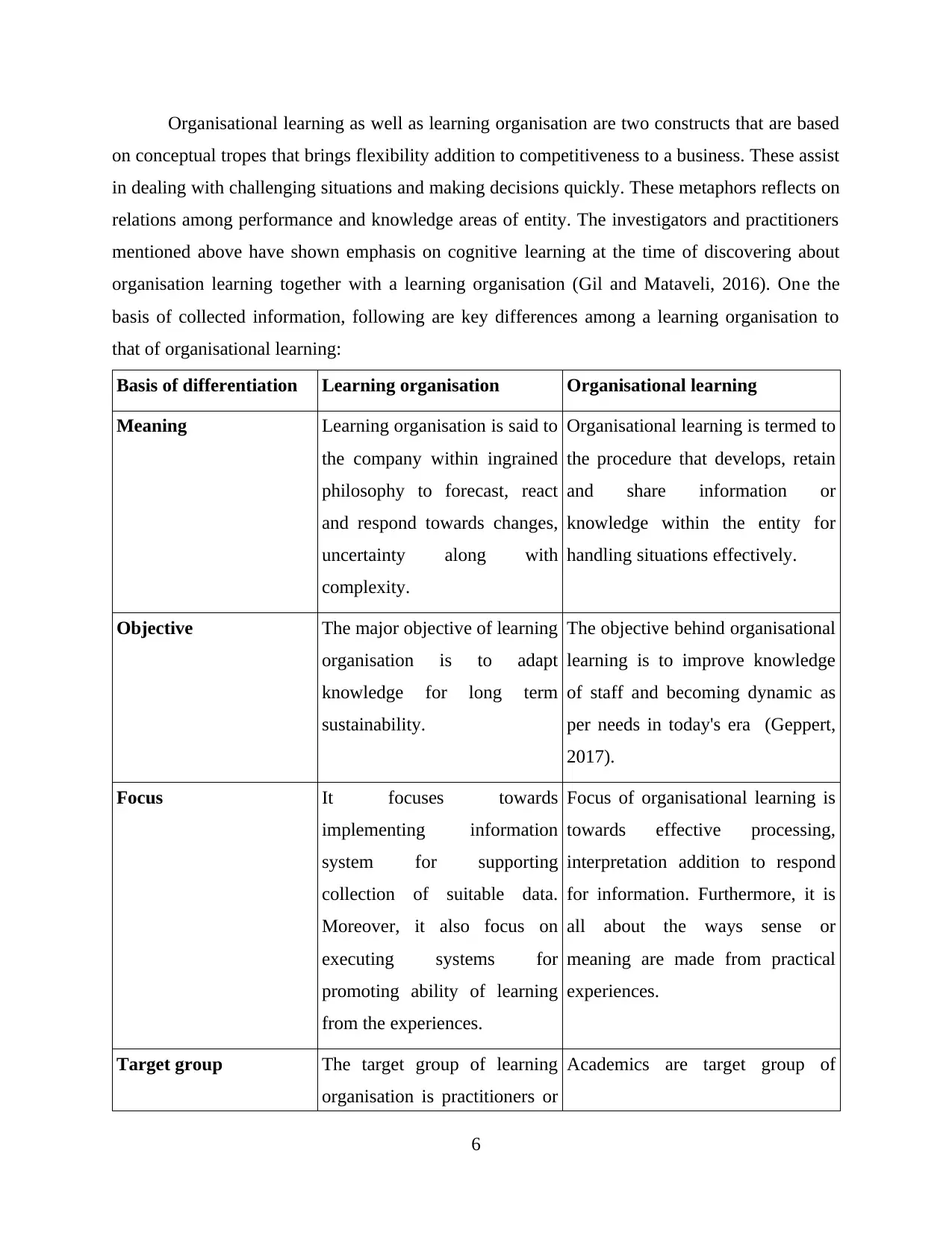
Organisational learning as well as learning organisation are two constructs that are based
on conceptual tropes that brings flexibility addition to competitiveness to a business. These assist
in dealing with challenging situations and making decisions quickly. These metaphors reflects on
relations among performance and knowledge areas of entity. The investigators and practitioners
mentioned above have shown emphasis on cognitive learning at the time of discovering about
organisation learning together with a learning organisation (Gil and Mataveli, 2016). One the
basis of collected information, following are key differences among a learning organisation to
that of organisational learning:
Basis of differentiation Learning organisation Organisational learning
Meaning Learning organisation is said to
the company within ingrained
philosophy to forecast, react
and respond towards changes,
uncertainty along with
complexity.
Organisational learning is termed to
the procedure that develops, retain
and share information or
knowledge within the entity for
handling situations effectively.
Objective The major objective of learning
organisation is to adapt
knowledge for long term
sustainability.
The objective behind organisational
learning is to improve knowledge
of staff and becoming dynamic as
per needs in today's era (Geppert,
2017).
Focus It focuses towards
implementing information
system for supporting
collection of suitable data.
Moreover, it also focus on
executing systems for
promoting ability of learning
from the experiences.
Focus of organisational learning is
towards effective processing,
interpretation addition to respond
for information. Furthermore, it is
all about the ways sense or
meaning are made from practical
experiences.
Target group The target group of learning
organisation is practitioners or
Academics are target group of
6
on conceptual tropes that brings flexibility addition to competitiveness to a business. These assist
in dealing with challenging situations and making decisions quickly. These metaphors reflects on
relations among performance and knowledge areas of entity. The investigators and practitioners
mentioned above have shown emphasis on cognitive learning at the time of discovering about
organisation learning together with a learning organisation (Gil and Mataveli, 2016). One the
basis of collected information, following are key differences among a learning organisation to
that of organisational learning:
Basis of differentiation Learning organisation Organisational learning
Meaning Learning organisation is said to
the company within ingrained
philosophy to forecast, react
and respond towards changes,
uncertainty along with
complexity.
Organisational learning is termed to
the procedure that develops, retain
and share information or
knowledge within the entity for
handling situations effectively.
Objective The major objective of learning
organisation is to adapt
knowledge for long term
sustainability.
The objective behind organisational
learning is to improve knowledge
of staff and becoming dynamic as
per needs in today's era (Geppert,
2017).
Focus It focuses towards
implementing information
system for supporting
collection of suitable data.
Moreover, it also focus on
executing systems for
promoting ability of learning
from the experiences.
Focus of organisational learning is
towards effective processing,
interpretation addition to respond
for information. Furthermore, it is
all about the ways sense or
meaning are made from practical
experiences.
Target group The target group of learning
organisation is practitioners or
Academics are target group of
6
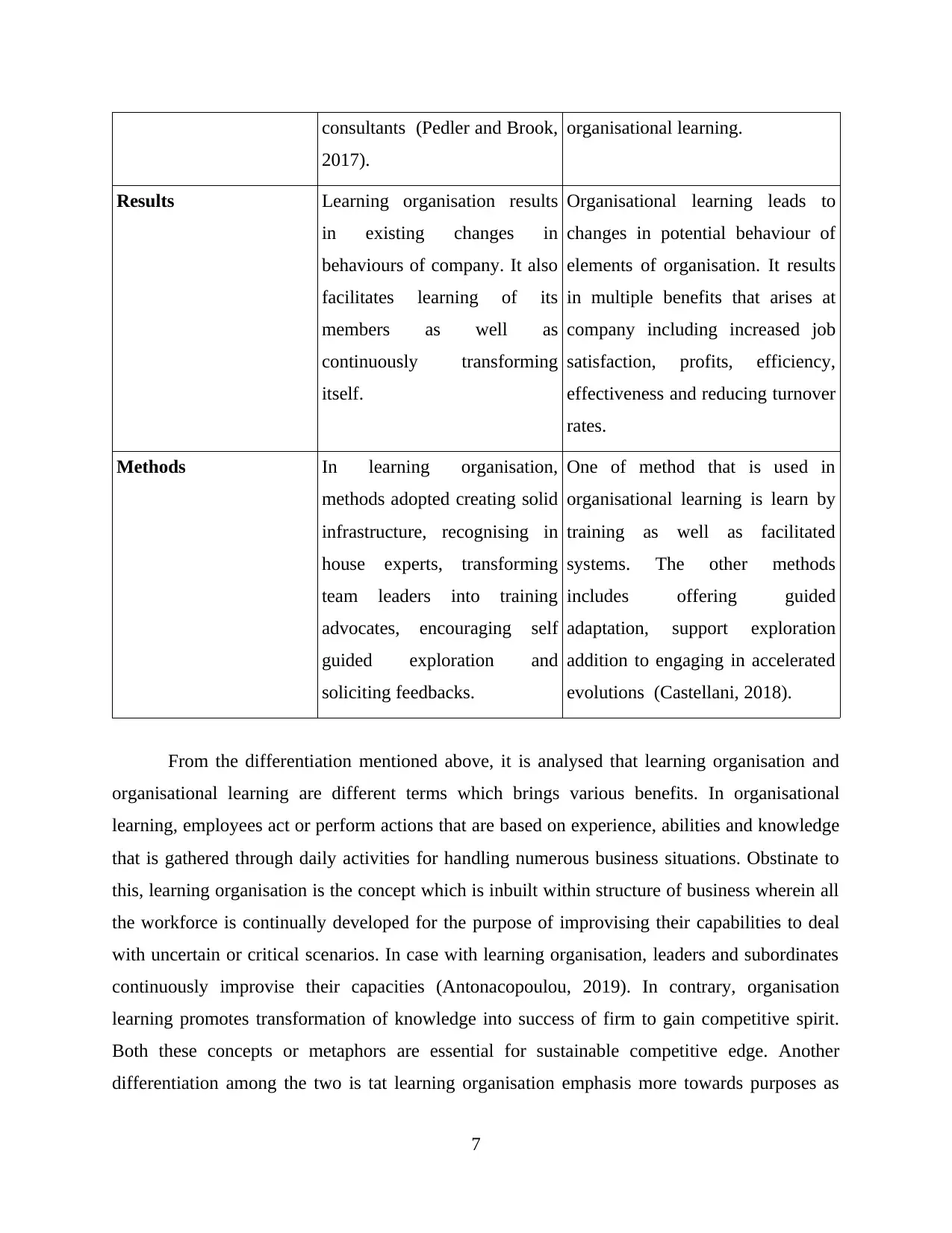
consultants (Pedler and Brook,
2017).
organisational learning.
Results Learning organisation results
in existing changes in
behaviours of company. It also
facilitates learning of its
members as well as
continuously transforming
itself.
Organisational learning leads to
changes in potential behaviour of
elements of organisation. It results
in multiple benefits that arises at
company including increased job
satisfaction, profits, efficiency,
effectiveness and reducing turnover
rates.
Methods In learning organisation,
methods adopted creating solid
infrastructure, recognising in
house experts, transforming
team leaders into training
advocates, encouraging self
guided exploration and
soliciting feedbacks.
One of method that is used in
organisational learning is learn by
training as well as facilitated
systems. The other methods
includes offering guided
adaptation, support exploration
addition to engaging in accelerated
evolutions (Castellani, 2018).
From the differentiation mentioned above, it is analysed that learning organisation and
organisational learning are different terms which brings various benefits. In organisational
learning, employees act or perform actions that are based on experience, abilities and knowledge
that is gathered through daily activities for handling numerous business situations. Obstinate to
this, learning organisation is the concept which is inbuilt within structure of business wherein all
the workforce is continually developed for the purpose of improvising their capabilities to deal
with uncertain or critical scenarios. In case with learning organisation, leaders and subordinates
continuously improvise their capacities (Antonacopoulou, 2019). In contrary, organisation
learning promotes transformation of knowledge into success of firm to gain competitive spirit.
Both these concepts or metaphors are essential for sustainable competitive edge. Another
differentiation among the two is tat learning organisation emphasis more towards purposes as
7
2017).
organisational learning.
Results Learning organisation results
in existing changes in
behaviours of company. It also
facilitates learning of its
members as well as
continuously transforming
itself.
Organisational learning leads to
changes in potential behaviour of
elements of organisation. It results
in multiple benefits that arises at
company including increased job
satisfaction, profits, efficiency,
effectiveness and reducing turnover
rates.
Methods In learning organisation,
methods adopted creating solid
infrastructure, recognising in
house experts, transforming
team leaders into training
advocates, encouraging self
guided exploration and
soliciting feedbacks.
One of method that is used in
organisational learning is learn by
training as well as facilitated
systems. The other methods
includes offering guided
adaptation, support exploration
addition to engaging in accelerated
evolutions (Castellani, 2018).
From the differentiation mentioned above, it is analysed that learning organisation and
organisational learning are different terms which brings various benefits. In organisational
learning, employees act or perform actions that are based on experience, abilities and knowledge
that is gathered through daily activities for handling numerous business situations. Obstinate to
this, learning organisation is the concept which is inbuilt within structure of business wherein all
the workforce is continually developed for the purpose of improvising their capabilities to deal
with uncertain or critical scenarios. In case with learning organisation, leaders and subordinates
continuously improvise their capacities (Antonacopoulou, 2019). In contrary, organisation
learning promotes transformation of knowledge into success of firm to gain competitive spirit.
Both these concepts or metaphors are essential for sustainable competitive edge. Another
differentiation among the two is tat learning organisation emphasis more towards purposes as
7
⊘ This is a preview!⊘
Do you want full access?
Subscribe today to unlock all pages.

Trusted by 1+ million students worldwide
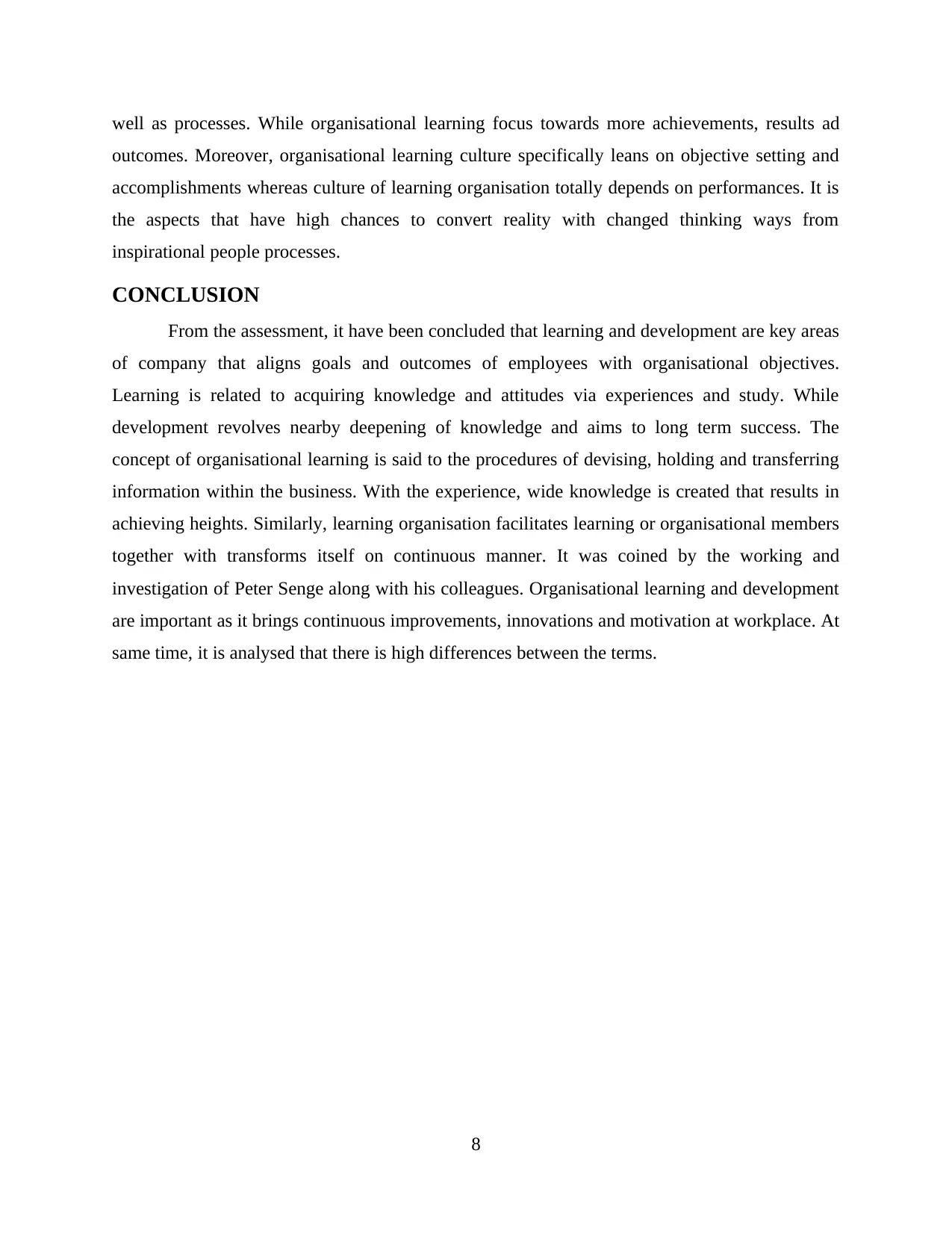
well as processes. While organisational learning focus towards more achievements, results ad
outcomes. Moreover, organisational learning culture specifically leans on objective setting and
accomplishments whereas culture of learning organisation totally depends on performances. It is
the aspects that have high chances to convert reality with changed thinking ways from
inspirational people processes.
CONCLUSION
From the assessment, it have been concluded that learning and development are key areas
of company that aligns goals and outcomes of employees with organisational objectives.
Learning is related to acquiring knowledge and attitudes via experiences and study. While
development revolves nearby deepening of knowledge and aims to long term success. The
concept of organisational learning is said to the procedures of devising, holding and transferring
information within the business. With the experience, wide knowledge is created that results in
achieving heights. Similarly, learning organisation facilitates learning or organisational members
together with transforms itself on continuous manner. It was coined by the working and
investigation of Peter Senge along with his colleagues. Organisational learning and development
are important as it brings continuous improvements, innovations and motivation at workplace. At
same time, it is analysed that there is high differences between the terms.
8
outcomes. Moreover, organisational learning culture specifically leans on objective setting and
accomplishments whereas culture of learning organisation totally depends on performances. It is
the aspects that have high chances to convert reality with changed thinking ways from
inspirational people processes.
CONCLUSION
From the assessment, it have been concluded that learning and development are key areas
of company that aligns goals and outcomes of employees with organisational objectives.
Learning is related to acquiring knowledge and attitudes via experiences and study. While
development revolves nearby deepening of knowledge and aims to long term success. The
concept of organisational learning is said to the procedures of devising, holding and transferring
information within the business. With the experience, wide knowledge is created that results in
achieving heights. Similarly, learning organisation facilitates learning or organisational members
together with transforms itself on continuous manner. It was coined by the working and
investigation of Peter Senge along with his colleagues. Organisational learning and development
are important as it brings continuous improvements, innovations and motivation at workplace. At
same time, it is analysed that there is high differences between the terms.
8
Paraphrase This Document
Need a fresh take? Get an instant paraphrase of this document with our AI Paraphraser
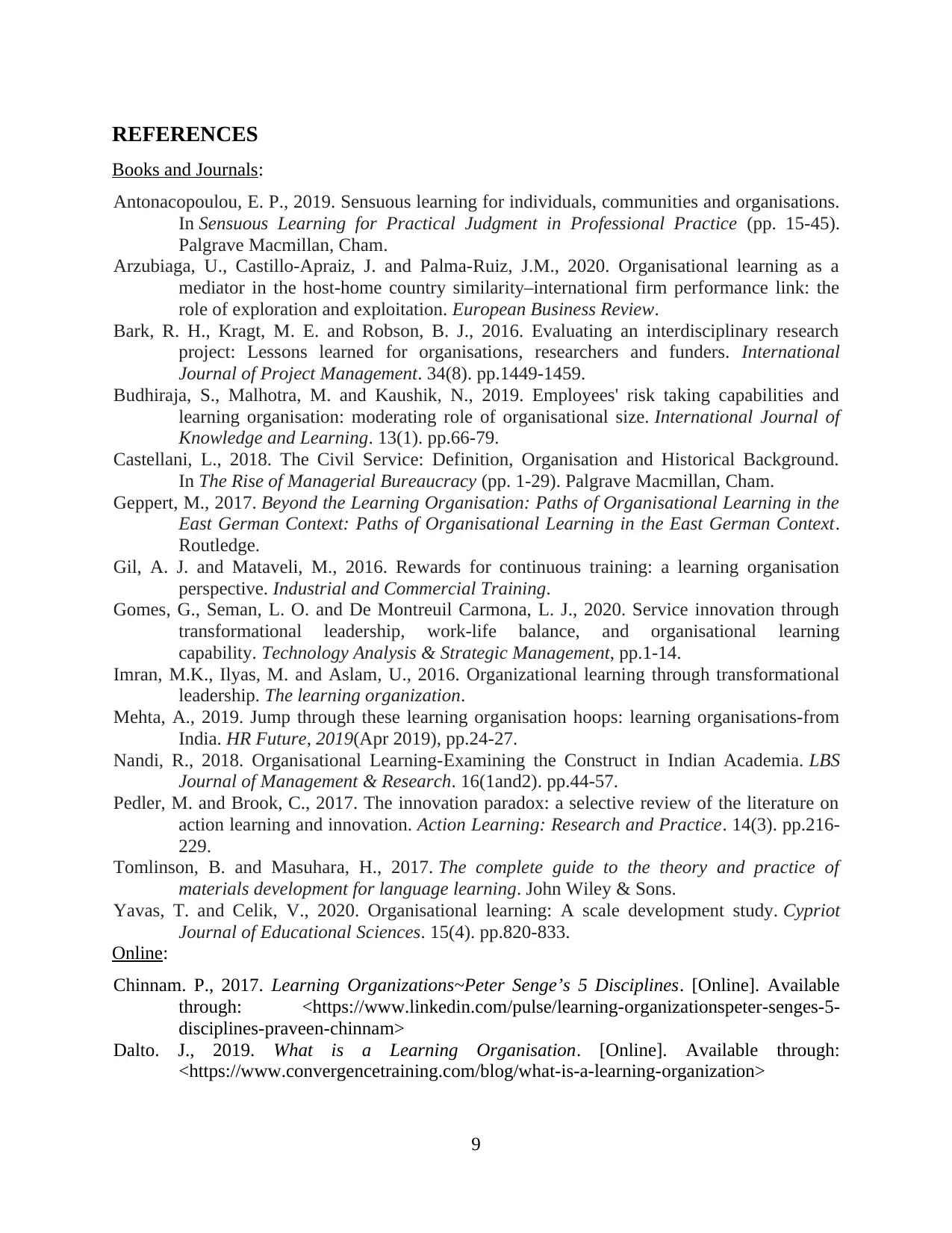
REFERENCES
Books and Journals:
Antonacopoulou, E. P., 2019. Sensuous learning for individuals, communities and organisations.
In Sensuous Learning for Practical Judgment in Professional Practice (pp. 15-45).
Palgrave Macmillan, Cham.
Arzubiaga, U., Castillo-Apraiz, J. and Palma-Ruiz, J.M., 2020. Organisational learning as a
mediator in the host-home country similarity–international firm performance link: the
role of exploration and exploitation. European Business Review.
Bark, R. H., Kragt, M. E. and Robson, B. J., 2016. Evaluating an interdisciplinary research
project: Lessons learned for organisations, researchers and funders. International
Journal of Project Management. 34(8). pp.1449-1459.
Budhiraja, S., Malhotra, M. and Kaushik, N., 2019. Employees' risk taking capabilities and
learning organisation: moderating role of organisational size. International Journal of
Knowledge and Learning. 13(1). pp.66-79.
Castellani, L., 2018. The Civil Service: Definition, Organisation and Historical Background.
In The Rise of Managerial Bureaucracy (pp. 1-29). Palgrave Macmillan, Cham.
Geppert, M., 2017. Beyond the Learning Organisation: Paths of Organisational Learning in the
East German Context: Paths of Organisational Learning in the East German Context.
Routledge.
Gil, A. J. and Mataveli, M., 2016. Rewards for continuous training: a learning organisation
perspective. Industrial and Commercial Training.
Gomes, G., Seman, L. O. and De Montreuil Carmona, L. J., 2020. Service innovation through
transformational leadership, work-life balance, and organisational learning
capability. Technology Analysis & Strategic Management, pp.1-14.
Imran, M.K., Ilyas, M. and Aslam, U., 2016. Organizational learning through transformational
leadership. The learning organization.
Mehta, A., 2019. Jump through these learning organisation hoops: learning organisations-from
India. HR Future, 2019(Apr 2019), pp.24-27.
Nandi, R., 2018. Organisational Learning-Examining the Construct in Indian Academia. LBS
Journal of Management & Research. 16(1and2). pp.44-57.
Pedler, M. and Brook, C., 2017. The innovation paradox: a selective review of the literature on
action learning and innovation. Action Learning: Research and Practice. 14(3). pp.216-
229.
Tomlinson, B. and Masuhara, H., 2017. The complete guide to the theory and practice of
materials development for language learning. John Wiley & Sons.
Yavas, T. and Celik, V., 2020. Organisational learning: A scale development study. Cypriot
Journal of Educational Sciences. 15(4). pp.820-833.
Online:
Chinnam. P., 2017. Learning Organizations~Peter Senge’s 5 Disciplines. [Online]. Available
through: <https://www.linkedin.com/pulse/learning-organizationspeter-senges-5-
disciplines-praveen-chinnam>
Dalto. J., 2019. What is a Learning Organisation. [Online]. Available through:
<https://www.convergencetraining.com/blog/what-is-a-learning-organization>
9
Books and Journals:
Antonacopoulou, E. P., 2019. Sensuous learning for individuals, communities and organisations.
In Sensuous Learning for Practical Judgment in Professional Practice (pp. 15-45).
Palgrave Macmillan, Cham.
Arzubiaga, U., Castillo-Apraiz, J. and Palma-Ruiz, J.M., 2020. Organisational learning as a
mediator in the host-home country similarity–international firm performance link: the
role of exploration and exploitation. European Business Review.
Bark, R. H., Kragt, M. E. and Robson, B. J., 2016. Evaluating an interdisciplinary research
project: Lessons learned for organisations, researchers and funders. International
Journal of Project Management. 34(8). pp.1449-1459.
Budhiraja, S., Malhotra, M. and Kaushik, N., 2019. Employees' risk taking capabilities and
learning organisation: moderating role of organisational size. International Journal of
Knowledge and Learning. 13(1). pp.66-79.
Castellani, L., 2018. The Civil Service: Definition, Organisation and Historical Background.
In The Rise of Managerial Bureaucracy (pp. 1-29). Palgrave Macmillan, Cham.
Geppert, M., 2017. Beyond the Learning Organisation: Paths of Organisational Learning in the
East German Context: Paths of Organisational Learning in the East German Context.
Routledge.
Gil, A. J. and Mataveli, M., 2016. Rewards for continuous training: a learning organisation
perspective. Industrial and Commercial Training.
Gomes, G., Seman, L. O. and De Montreuil Carmona, L. J., 2020. Service innovation through
transformational leadership, work-life balance, and organisational learning
capability. Technology Analysis & Strategic Management, pp.1-14.
Imran, M.K., Ilyas, M. and Aslam, U., 2016. Organizational learning through transformational
leadership. The learning organization.
Mehta, A., 2019. Jump through these learning organisation hoops: learning organisations-from
India. HR Future, 2019(Apr 2019), pp.24-27.
Nandi, R., 2018. Organisational Learning-Examining the Construct in Indian Academia. LBS
Journal of Management & Research. 16(1and2). pp.44-57.
Pedler, M. and Brook, C., 2017. The innovation paradox: a selective review of the literature on
action learning and innovation. Action Learning: Research and Practice. 14(3). pp.216-
229.
Tomlinson, B. and Masuhara, H., 2017. The complete guide to the theory and practice of
materials development for language learning. John Wiley & Sons.
Yavas, T. and Celik, V., 2020. Organisational learning: A scale development study. Cypriot
Journal of Educational Sciences. 15(4). pp.820-833.
Online:
Chinnam. P., 2017. Learning Organizations~Peter Senge’s 5 Disciplines. [Online]. Available
through: <https://www.linkedin.com/pulse/learning-organizationspeter-senges-5-
disciplines-praveen-chinnam>
Dalto. J., 2019. What is a Learning Organisation. [Online]. Available through:
<https://www.convergencetraining.com/blog/what-is-a-learning-organization>
9
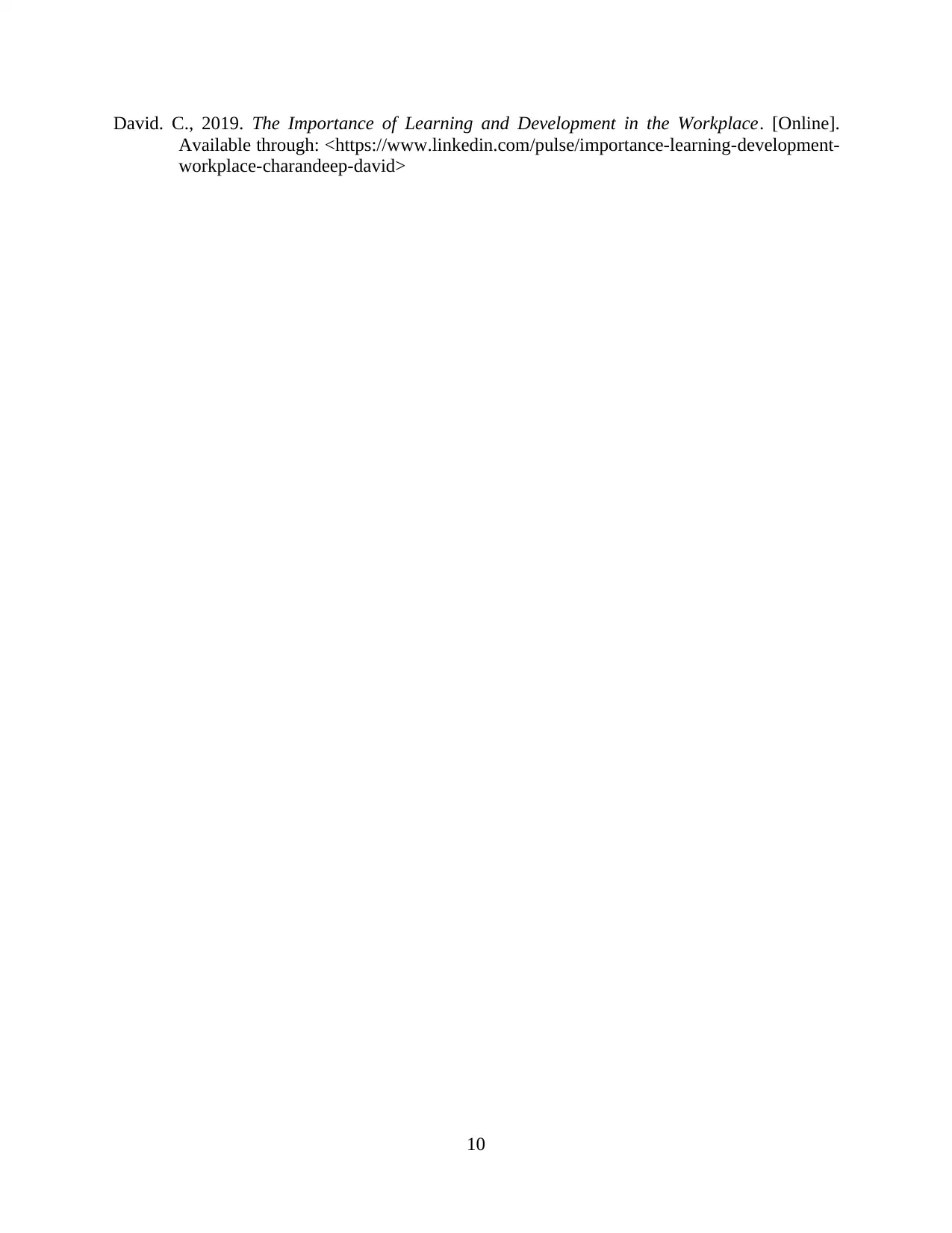
David. C., 2019. The Importance of Learning and Development in the Workplace. [Online].
Available through: <https://www.linkedin.com/pulse/importance-learning-development-
workplace-charandeep-david>
10
Available through: <https://www.linkedin.com/pulse/importance-learning-development-
workplace-charandeep-david>
10
⊘ This is a preview!⊘
Do you want full access?
Subscribe today to unlock all pages.

Trusted by 1+ million students worldwide
1 out of 12
Related Documents
Your All-in-One AI-Powered Toolkit for Academic Success.
+13062052269
info@desklib.com
Available 24*7 on WhatsApp / Email
![[object Object]](/_next/static/media/star-bottom.7253800d.svg)
Unlock your academic potential
Copyright © 2020–2026 A2Z Services. All Rights Reserved. Developed and managed by ZUCOL.




